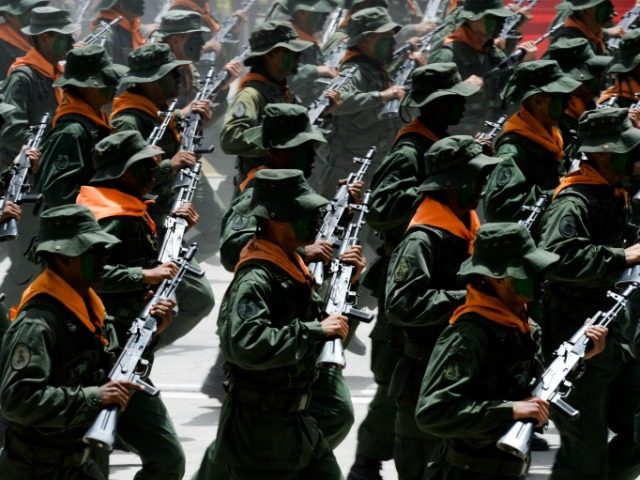Colombia, Canada, and Guyana refused to sign a declaration ruling out a military solution to the crisis in Venezuela on Sunday, agreeing with comments by the head of the Organization of American States.
In a declaration signed by Lima Group this week, 11 out of the 14 countries that make up the group, established to oppose the human rights violations of the country’s socialist dictatorship, signed a document rejecting “any type of action or declaration that implies military intervention or … threats or the use of violence.”
Representatives from Canada, Guyana, and Colombia refused to sign the document. Both the latter countries share a border with Venezuela and therefore have borne the brunt of the thousands of migrants fleeing every day in need of humanitarian assistance. Dictator Nicolás Maduro has also threatened to invade both countries.
The declaration came as a response to comments made by the head of the Organization of American States (OAS), Luis Almagro, who last Friday raised the possibility of a military solution to the crisis.
“As for military intervention to overthrow the Nicolas Maduro regime, I think we should not rule out any option, because definitively, the Nicolas Maduro regime is perpetrating crimes against humanity towards its population, and violations of human rights,” said Almagro.
“The suffering of the people, in this induced exodus, that it is driving, means that diplomacy remains the first option but we can’t exclude any action,” he continued.
It is the first time that the Lima group, founded last year to help bring an end to the Venezuelan crisis, has publicly disagreed on a major issue with Almagro.
“The Lima Group rejected the military intervention against Venezuela and left Luis Almagro, slavish agent of the Empire, all alone with his coup plotting obsession,” tweeted leftist Bolivian strongman Evo Morales, a close ally of the Maduro regime, on Sunday. “It is a defeat of Trump’s interventionism and a victory of dignity and courage of Venezuela and Latin America.”
The Lima Group rejected the military intervention against Venezuela and left Luis Almagro, slavish agent of the Empire, all alone with his coup plotting obsession. It is a defeat of Trump’s interventionism and a victory of dignity and courage of Venezuela and Latin America.
— Evo Morales Ayma (@evoespueblo) September 16, 2018
The dispute follows increased discussion in the U.S. over Washington’s response to the crisis. The New York Times reported last week that the Trump administration recently met with disaffected members of the Venezuelan military who planned to oust Maduro by force. The U.S. ultimately decided not to back the operation over fears that it lacked thorough planning.
In July, the Associated Press also reported that Trump personally pressed aides on whether to invade the country, although regional leaders, including Colombia’s former President Juan Manuel Santos, met the idea with opposition. Last year, Trump said that as well as imposing economic sanctions, he was refusing to rule out a military solution to the crisis.
Sen. Marco Rubio (R-FL), one of Washington’s leading advocates for regime change, said in an interview last month that the U.S. should consider a military solution in the interests of national security, given the Maduro regime’s support for terrorist organizations such as Hezbollah and the Islamic State.
“I believe that the Armed Forces of the United States are only used in the event of a threat to national security,” he said in an interview with Spanish radio station Univision last month. “I believe that there is a very strong argument that can be made at this time that Venezuela and the Maduro regime has become a threat to the region and even to the United States.”
Follow Ben Kew on Facebook, Twitter at @ben_kew, or email him at bkew@breitbart.com.

COMMENTS
Please let us know if you're having issues with commenting.